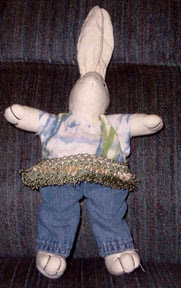I think Descartes must not have had a pet. I have watched my dogs think, make choices, and even try to deflect behavior.
My last dog, Ender, had the bad habit of getting in the trash while we were out of the house. We could always tell when he had done this because of his behavior when we got home. This house is a split entry, and we come in on the bottom level. Ender would greet us on the landing, and, with his body, would attempt to block us from going up the stairs. All during the blocking process he would be wagging his tail, and smiling this ingratiating smile. You just knew if he could talk he would have been saying "Hey, guys, no need to go upstairs. Let's stay down here and watch TV."

Ender ringing in the New Year, 2006
Obviously, the decision to root around in the trash was not one of Ender's better choices. Perhaps wearing the New Year's Eve crown could also be counted as a poor decision, but Ender was always a good sport.
I have watched him make good choices, however. A study I read suggested that dogs could count in a rudimentary fashion. To test the premise, researchers would show the dog an array of treats, and then cover them. Researchers would then remove one or more of the treats, or would leave all of the treats there. They determined that dogs looked longer at the array during the trials where treats were removed than when the number was expected indicating that the dogs were surprised at the number of treats shown.
I decided to test this on Ender. Unfortunately I wasn't able to determine whether or not he could count. He was a food guarder, and became agitated when the treats were hidden. However, I got some interesting results when I changed the experimental design a little. I would lay out a variety of treats- some big, some small, some crunchy, some hard. I expected that he would go for his favorite treats first, but that wasn't the case. He would vary his selections based on what I put out there- he didn't always choose his favorites, and he didn't always go for the same thing first. He would investigate, smelling all of the treats first, before making his selection. He obviously had criteria upon which he was basing his decision. What that criteria was, well, that's still a mystery.
Researchers at the University of Vienna found that dogs have an emotional life, and react to unfair situations. They gave two dogs sitting next to each other unequal treats for doing the same behavior; in this case, "shaking" paws with the researcher. The dog given the smaller treat would quit performing the action sooner than the other dog. You may read more about the study here
Ender is gone now, and we share our house with Boodles and Juniper. You will be reading more about them over time. For now, please watch the short video below, and forgive me putting words in their mouths.
To read more about Ender, please click here:







Willa this is wonderful! Keep it up!
ReplyDeleteDonna
Thanks Donna- I am glad you like it! Hope you got lots of baby time this holiday-
ReplyDelete